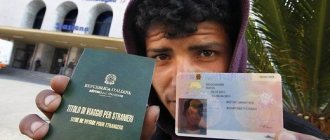Labor migrants from the CIS in Ireland: general information
Labor immigration to Ireland has long been popular among residents of the post-Soviet space. Over the past two decades, many people from almost all the CIS republics have visited Ireland and appreciated the opportunities provided to them by working in this country. Russia and Ukraine have traditionally become the main suppliers of labor migrants to Ireland. Citizens of these countries, accustomed to earning money abroad, have experienced in practice the difference between working in Ireland and less developed EU countries such as Poland or the Czech Republic. That is why many of them, leaving the usual direction of labor migration to Europe, went to work on Green Island.
Ireland's GDP shows record growth rates among other EU countries. The unemployment rate is around 7%. Work in Ireland is available both to professionals with appropriate training and to low-skilled migrant workers, including seasonal workers. Statistics show that in Ireland today, every tenth employee is a foreigner. A distinctive feature when working in Ireland is the loyal and friendly attitude of local employers towards foreigners.
Ireland is a country of harsh beauty, work in which will not only replenish a migrant’s budget, but also broaden his horizons
What specialists are needed on the Emerald Island
Current vacancies in Ireland are posted by those who need qualified personnel. The country requires:
- Programmers.
- Computer analysts.
- Top managers.
- Medical specialists. Including radiologists, biotechnicians and nutritionists.
- Architects.
Financial inspectors are in demand. There are a number of vacancies for unskilled personnel. High demand for nannies, movers, electricians, builders. Factories require butchers and other experienced specialists.
How to find a job in Ireland: basic methods
You can get to work in Ireland with the help of intermediaries or on your own. In the first case, you will have to pay quite high commissions. Using the services of intermediaries is much easier for those who are going to work abroad for the first time. Many problems with job search, paperwork and other hassles automatically disappear. But cooperation with intermediaries also has significant disadvantages. Not all of them are conscientious. A significant portion of firms or individuals do not fulfill their obligations. At the same time, the money that is paid to them in advance by the applicant, as a rule, is not returned. Therefore, when using the services of an intermediary, it is strongly recommended that you familiarize yourself with his registration documents, visit the office, find out whether he is registered in the international tax system and whether he has a special identification number (VAT-number), and also read the reviews of those who I already found a job with his help.
When searching on your own, it is advisable to immediately contact those who have already worked in Ireland or those who continue to work there. The information from these people will be most useful because it is relevant and reflects the real state of affairs. You can also take advantage of the Internet and the media.
You can contact one of the most famous job search sites in this country or use the services of the following Irish online resources:
- cpl.ie
- gradireland.com
- irishjobs.ie
- jobs.ie.
You can start your job search by visiting special Internet sites
Information about the availability of vacancies in Ireland can be posted on international websites:
- careerjet.ie
- www.indeed.com
- learn4good.com.
Among the media there are printed publications and their websites, where you can find useful information about the availability of vacancies:
- Irish Independent
- The Irish Times
- Business Post.
Where to look for work
There are several ways in which a foreign candidate can find a desired vacancy. Some prefer to select a position on their own and analyze information from local employers, while others use the services of intermediaries. Working and studying in Ireland are two interrelated components, without which it is almost impossible to ensure a decent life.
Internet
Many people are looking for work online. In Ireland, there are "in-house" employment resources online, such as gradireland.com, jobs.ie, or nrf.ie.
When looking for the job you want, it is not recommended to ignore social networks. The special website Linkedin (linkedin.com) publishes a wide database of offers from employers in the Irish Republic. It is important to know here that for some time now this social network has been blocked in Russia, so it can only be used from other countries.
The opportunity to search for coveted positions directly on the Internet portals of British companies should not be discarded. Having analyzed the necessary vacancy announcements, the applicant sends out a questionnaire (resume) and after a while calls a representative of the personnel service to find out the result of the consideration of the issue.
When looking for work on your own, it is recommended to communicate with those migrants who are already working for the benefit of the Irish economy; this can be useful at an interview or in the workplace.
With the help of agencies
Intermediary companies are also involved in the selection of positions. For a fee, recruitment agencies offer to find a job, providing the applicant with a database of available vacancies. They also take on the responsibility of drawing up a resume and sending information about the applicant for the position to the employing company. But in the recruiting services market, not all intermediaries are bona fide.
Other
The applicant is also offered information about vacancies posted by local newspapers and magazines - Business Post, The Irish Times. In them, for a fee, a foreigner can publish an advertisement that may be of interest to the employer.
Basic requirements for candidates
Who do Irish employers want to hire? They offer work primarily to foreign labor migrants who:
- have good health;
- do not have a criminal past or present;
- have a sufficient level of education and specialized work experience;
- have high performance;
- sociable;
- speak English at a sufficient level.
Recommendations from Russian or, for example, Ukrainian employers will not play a significant role in finding employment in Ireland if they are not given by the top management of international companies. Applicants will need to provide documents on education that corresponds to the specialty declared in the vacancy. It should be noted that, unlike employers in Russia and other CIS countries, the Irish are very scrupulous about the correspondence of education and position. While in almost any CIS country a person with a teaching diploma can become a bank employee, in Ireland this state of affairs is simply impossible. This situation is typical for almost all countries of the European Union. But in some of them, especially in Spain, Italy, Greece, and Bulgaria, employers treat the issue of education somewhat superficially. The main thing for them is skills and specialized work experience.
To work in Ireland, it is important that your education diploma matches the chosen position.
To be fair, it should be noted that if you have a well-paid job, then you don’t care where you live - you will provide yourself with a decent standard of living. And the weather will not seem so nasty through the window of an expensive car and friendly people from the window of an expensive restaurant. Well, he has a high social status in Africa too. I've met Russians who have settled well there and are really grateful for what Ireland has offered them.
Marina 564234
https://irecommend.ru/content/moi-opyt-v-irlandii
In Ireland, as in all EU countries, documents on education received in the CIS countries will require mandatory nostrification. Confirmation is a rather lengthy and expensive process. However, after graduation, the holder of a European diploma has great employment prospects in any EU country, as well as in the USA, Canada or Australia. A diploma nostrified in any EU country does not require further legalization. Applicants for vacancies requiring specialized higher education should pay special attention to this point. In Ireland, there is a special website where you can check the status of a document, both in the process of nostrification and already recognized. When hiring a foreigner, Irish employers will be sure to check information about his education with the specified online resource.
Video: work and salaries in Ireland
Average salary in Ireland, who gets paid and how much
Ireland is very democratic in relation to foreign labor migrants, so they experience virtually no discrimination in wages. The average salary in Ireland is 2140 euros per month. This amount is already “net”, that is, the amount that is paid in person. This is a fairly high salary in the European Union, even compared to Germany or the Netherlands. Ireland has an official minimum wage of 9.25 euros per hour of work . It is typical that the wages of young (by age) workers are somewhat lower:
- under 18 years of age receive 6.48 euros per hour of work,
- from 18 to 19 years old - 7.4 euros,
- from 19 to 20–8.33 euros.
After 20 years, they are equal to adults and already receive 9.25 euros or more per hour of work.
The average salary in Dublin is €2,850 per month, which is above the national average. This suggests that Ireland supports the EU trend of uneven pay for the same work in major cities and provinces.
The official currency of Ireland is the euro.
The monthly after-tax income of representatives of various professions that are of interest to foreign migrants in Ireland may be as follows:
- salesperson in an electronics store - 1500–2200 euros;
- driver of passenger transport - 2200–3300 euros;
- IT specialist (intermediate level) – 3,500 euros;
- paramedic – 2950 euros;
- business analyst - 2900 euros;
- dentist - 4800 euros and more;
- worker at the enterprise - 2200 euros;
- seasonal worker – 1500 euros;
- waiter - 2000 euros plus “tip” (about 10% of the bill);
- maids - 2200 euros;
- civil engineers - 3000 euros;
- architects - 4000 euros;
- geologists - 4500 euros and more.
Naturally, average monthly wages are given. Typically, Irish employers pay year-end bonuses before Christmas that amount to 5% or more of annual salary.
English proficiency
In Ireland, two languages are spoken - Irish and English. The vast majority of the island's population speaks English, so to get a job in Ireland you only need to know it.
To work in Ireland you must have a good knowledge of English
But it is necessary to speak English at a high level, since it will not be possible to get by with knowledge of a few common phrases (as, for example, when working in Israel, where the majority of the population speaks Russian). Knowledge of English is mandatory for representatives of those professions that require constant communication with people. These could be, for example, the work of a doctor, a company manager, a store sales assistant, a public transport driver, or a waiter. The level of English proficiency largely determines a candidate's chances of filling a particular vacancy in Ireland. By the way, all job advertisements on Irish websites are posted in English and you will also have to communicate with a potential employer in English.
Life here is characterized by great calm and confidence in the future, even in such difficult times as now. The main thing is that there would be work. I have it, although I work on a reduced schedule. But I can afford to pay off the loan for the house, which is now fabulously “profitable” - a little over four percent! Have you ever dreamed of this in Russia? I can easily buy a ticket to the same Australia, where I have already been twice, at a price that is sometimes even lower than if I were flying to my small homeland in our Far East to visit my sister.
Sergei Menshakov
https://windowrussia.ruvr.ru/2013_08_20/ZHizn-v-Irlandii-otlichaetsja-bolshim-spokojstviem-i-uverennostju-v-zavtrashnem-dne-6293/
The most in-demand professions in Ireland
Occupation of certain positions by foreign migrant workers in Ireland is prohibited by law. Today on Green Island the following professions that require specialized education are most in demand:
- IT specialists (software developers, system administrators, analysts, information security specialists);
- geologists;
- surveyors;
- civil engineers;
- business analysts;
- financial market experts;
- top managers;
- architects;
- dentists.
Computer and electronics specialists are in demand in Ireland and their work is well paid
Migrant workers who do not have a specialized education can use their skills in the following specialties:
- service personnel in restaurants, cafes and hotels;
- bus, trolleybus and taxi drivers;
- miners;
- builders of various specialties;
- workers in the agricultural sector (farm workers, general machine operators);
- junior medical staff;
- employees of private security agencies;
- general workers.
Who is not needed in Ireland
Representatives of a number of professions that are quite in demand at home may, with a high degree of probability, not find work in their specialty in Ireland. These include:
- office workers;
- tailors, garment workers;
- designers;
- artists;
- electronics repair specialists.
Performing seasonal work
In Ireland, like in many EU countries, agriculture is developed. The agro-industrial sector of the economy requires many workers during harvesting. You can work in Ireland for up to three months without obtaining a special visa, so many migrant workers from the CIS countries come for seasonal work . Seasonal work involves picking vegetables, berries and even mushrooms. Earnings directly depend on the size of the harvest of a particular year, as well as on the amount of work. You can get 1,500 or more euros per month. As a rule, Irish farmers pay wages based on output, that is, on the volume of harvest delivered. Seasonal work in Ireland is also interesting for students, who can earn a fairly large amount in 2–3 months, more than covering the cost of a year’s study at a domestic university.
Video: about the cost of living in Ireland and other nuances
Finding a job in Ireland is not easy, but with the right preparation and following the advice of experienced people, you can make the employment process much easier and faster. To study and work in Ireland, you can choose a suitable place of work depending on your level of English proficiency. The better it is, the correspondingly higher the chance of successful employment.
As in most European countries, work is easier to find in the capital and other major cities, so if you live in Dublin, Galway or Cork, you have a much better chance of finding a job or part-time job. The Study and Work in Ireland program is a unique opportunity to enjoy Irish culture and improve your English. In addition, Dublin is a relatively small city that is easy to navigate.
If you want to find a job in Dublin, our tips can help you.
New laws on long-term visas (for non-EU students)
From 1 January 2015, students in Ireland on a long-term visa with a study period of 6 months can work up to 20 hours a week during their studies and up to 40 hours a week during holidays, as well as in May, June to August and during from December 15 to January 16 inclusive.
For more detailed information about visas and finding work in Ireland, we recommend visiting the official website of the Irish Immigration and Naturalization Service (INIS):
www.inis.gov.ie
1 – How to find a job in Dublin
Based on our experience, the most effective (and at the same time time-consuming) way to find a job in Ireland is to visit the busiest parts of the city where shops and retail outlets are concentrated. Many companies post a recruitment notice right on the door. This way you can find various options for part-time work, including those that are not presented on the Internet. In addition, you get an advantage over other applicants by personally visiting the company and introducing yourself.
Remember sign language! If your English is not perfect, think in advance about the answers to the questions you may be asked, work through different options for your presentation, and don’t forget about a confident handshake and eye contact with the employer. A good greeting phrase might be the following:
“Hi, my name is Olga and I'd like to find out more about the position of sales assistant advertised in your window”
In addition, there are a large number of job search sites, such as www.jobs.ie, www.gumtree.ie, www.irishjobs.ie and www.monster.ie.
Your personal pages on social networks also play a significant role in employment and statistics show that a personal page on Facebook is the first resource where a potential employer will turn in search of additional information about the applicant. If you have a lot of photos that may puzzle or even “scare” a possible employer, delete or restrict access to them.
For more qualified employment, we strongly recommend that you fill out your personal page on LinkedIn in detail and efficiently, since potential employers often turn to this resource when searching for personnel.
2 – Preparing your resume (CV)
Your resume is extremely important in your job search. A good or bad CV has a direct impact on your success in finding employment in Ireland.
In Ireland, employers expect a CV to be a maximum of 2 pages. The first page should contain your name, address, telephone number and email at the top and your existing qualifications and education below. A good photograph (ala “passport photo”) is an added bonus and often helps the employer remember you.
The second page should reflect previous work experience with the most relevant and relevant employment examples at the top. We recommend preparing at least two versions of your resume, each in accordance with the field of activity of the position for which you are applying. For example, if you are looking for a job in the tourism industry, try to highlight your personal communication skills, and if you are looking for a job in IT, draw the employer's attention to your experience with software and computers, as well as your ability to work under deadline conditions.
Your work experience is usually followed by personal information about your interests and hobbies. Many applicants needlessly underestimate this section, but it often plays a big role in proper communication with you, helps to get to know you better and assess how suitable you are for the position. If you indicate that you like to read, cook and walk in the park, your potential employer may think that you are a lonely and unsociable person, while if you write that you like to communicate, team games and travel, you will create an impression of yourself as a person , with whom it is easy to find a common language, to work well together, who will be open and friendly with clients, open to everything new, etc.
It is best to end your resume with recommendations indicating names, positions, and contact information about previous employers. If you need references in Ireland - your English teacher may know you better than anyone in the country and he or she will likely be happy to help you, just remember to ask permission to include them on your CV.
3 – How to Apply for a Job (Cover Letter/Formal Style)
First impressions are extremely important and using the right formal language in your message plays an important role in your job search in Ireland. Most employers require a cover letter. It can be 4-6 sentences long and should contain all the basic information needed.
Here are some of our tips for writing a successful cover letter;
1 – Who are you writing to?
Some job advertisements include a contact person. Here's how to best approach a potential employer:
If the name is known – Dear Paul / Dear Paula
If the name of the male contact is known – Dear Mr Edwards
If the ad contains the last name of a female contact person, possible address options are Miss ,
Mrs. and Ms. depending on marital status. To be on the safe side, we recommend using 'Ms' if you are not sure whether the contact person is married or not. For example Dear Ms. Edwards (pronounced "miss")
If there is no name in the ad - Dear Sir / Dear Madam or To whom it may concern
2 – Introduction
It’s best to start your cover letter by clarifying how you learned about this position:
I am writing to apply for the position of sales assistant as advertised on the Jobs.ie website.
(if the ad was on the site)
I would like to apply for the position of marketing manager as advertised in this week's edition of Metro.
(in case of an advertisement in a newspaper)
3 – Describe your experience
This could be a short paragraph something like this:
I have worked in the tourism industry for over 6 years first as a receptionist for a travel agency in (your city) and then in the marketing department of a hotel group.
4 – Explain why this job is right for you
For example:
I am applying for this position as I have a passion for the tourism industry and believe my experience would make me a highly suitable candidate.
or
I have always been interested in working for a dynamic company and have the relevant experience and expertise required to fulfill this role.
You can also briefly describe your skills and abilities that could be useful in this field of activity:
I believe I am highly suitable for this position as I have extensive of experience in retail,
can schedule and prioritize tasks and can work to strict deadlines. I also work particularly well with people and would enjoy working with clients and customers .
5 – Completing the letter
You can end the letter as follows:
I am available for an interview anytime and would welcome the opportunity to meet you and discuss this further.
I look forward to hearing from you and hope that you will be able to invite me for an interview.
I would very much welcome an opportunity to discuss my application in greater detail and convince you that I am the right person for the job.
6 – End of the letter
There are many ways to end a cover letter. Here are the most common:
If you do not know the name of the contact person – Yours faithfully
If you know the name – Yours sincerely / Best regards
4 – Passing the interview
First, find out where exactly the interview will take place. Think about how you will get there and approximately how much time it will take you to arrive a little earlier than the expected time. Being late, stressed and disorganized are not the best ways to make a good first impression! We recommend working out the optimal route 1-2 days before the interview. Google maps is a great help, but do not forget about the likelihood of traffic jams, disruptions in bus schedules, incorrect road signs and the distance from the bus stop to the company office. The unpredictable Irish weather can also throw a wrench into your life!
The dress code depends on the position for which you are applying, however, in our opinion, the 'smart casual' option will be optimal for any workplace, so no jeans, T-shirts, sneakers or sportswear.
We also strongly recommend that you familiarize yourself with the company's history, its ideology, plans for the future and corporate culture, as well as think through questions about salaries, responsibilities and employment contracts before the interview.
And finally – BE YOURSELF & GOOD LUCK!
Stages of official employment
At the end of 2014, some changes were made to Irish immigration legislation regarding migrant workers. As of this year, there are 9 different types of work visas. These innovations were intended to optimally fill gaps in the local labor market.
To obtain a work visa, Russians should contact the Irish Embassy in the Russian Federation. The basis for issuance will be a valid contract with the employer. The type of work visa opened will directly depend on the requirements of the vacancy and the professional training of the applicant. The contract must indicate all the necessary data: the duration of its validity, the foreigner’s working conditions, the amount of his salary and other nuances. The Irish employer must certify the contract with the country's Ministry of Labor, since in the European Union there is a uniform rule of labor legislation, which provides for priority filling of existing vacancies directly by EU citizens. Therefore, it will be necessary to justify the need to hire a foreign specialist for a certain position. There must be reasons for this: appropriate education, high level of qualifications, specialized work experience, recommendations from well-known employers.
A work visa gives its holder the right to freely leave and return to Ireland. In this case, no additional permissions are needed.
A work visa to Ireland is pasted into the passport and contains information about the terms and conditions of validity
The main type of work visa to Ireland will be the General Employment Permit, which is a standard work and residence permit . This type of visa allows you to fill most vacancies in various sectors of the Irish economy. The main requirement for a contract concluded between an employer and a labor migrant from the CIS is the annual amount of earnings, which should not be less than 30 thousand euros. A smaller contract amount is allowed only in exceptional cases.
The second most common type of work visa for Ireland is the Critical Skills Employment Permit. It is intended for highly qualified specialists with special skills, providing for the existence of a work contract with an annual salary of 60 thousand euros or more.
There are also separate types of work visas for other applicants:
- family members of migrant workers;
- students who have an internship in Ireland for more than three months;
- employees of foreign companies operating in Ireland;
- service personnel at cultural and sporting events;
- participants in scientific research;
- carrying out temporary work on Irish territory by foreign companies.
The processing time for an application for a work visa will vary depending on its type. Typically, Irish authorities render a decision within a period of five weeks to two months. The minimum visa validity period will be six months. However, it will cost the applicant 500 euros. If the validity period of a work visa is two years (and this is the maximum period), then it will cost 1000 euros. The money is transferred non-cash to the account specified by the embassy employees. You can pay both in euros and in national currency at the rate established on the day of payment. An employment visa is both permission to work and reside in Ireland. In addition to a valid employment contract, you will need to provide a standard package of documents that is necessary to obtain a visa to any country of the European Union.
For a work visa to Ireland, a standard application form is filled out, indicating the purpose of the trip - work
It seems like there was a crisis, but for me the Irish crisis is better than the Russian economic recovery. Now things are gradually getting better; demand is increasing accordingly, followed by prices, primarily for housing, since little was built during the crisis.
Anton
https://sd.and.ru/letters/immigration_news-85.html
How to extend a work visa
If you need to stay in Irish territory longer than expected, you will need to extend your work visa. This can be done at the migration department of the nearest police department located in the locality where the migrant worker works or lives. The maximum period for which a work visa can be extended is five years (including the original period of validity) . A work visa is the basis for obtaining a residence permit in Ireland. Its owner can invite his family, whose members will also have the right to officially work. After five years of living as a temporary resident, you can obtain permanent residence and spend the next five years like that. Next, you will have the opportunity to become a full Irish citizen. In this case, a mandatory condition is strict compliance with the laws of this state, including immigration, as well as the absence of debt to the Irish budget.
Who does not need a work permit
Irish immigration law provides that a work permit will not be required:
- foreign seasonal workers involved in harvesting at agricultural enterprises;
- seamen of merchant ships who are included in the relevant ship registers when the ship is on an international voyage;
- foreign specialists who do not intend to work in Ireland under a contract for more than three months.
Video: work permit in Ireland
Employment process
Basic requirements of employers for foreign candidates for employment :
- Knowledge of the language.
- Communication skills.
- Availability of appropriate education.
- Experience.
- Good health.
- High efficiency and hard work.
- No criminal record.
In principle, the requirements of Irish employers are no different from those in any other state .
Attention! All of the above characteristics must be documented.
To legally work in the country, you will need a special permit . Typically, the employer issues a work permit for its employees. This document is valid for 1-2 years, with subsequent possibility of extension.
To renew, you will need to provide a new employment contract with a specified period of employment. After continuous employment in Ireland, you can apply for permanent residence (permanent residence).
There are several types of work permits:
- Typically , the employee’s annual income must be at least 30 thousand euros, and there must be no applicants for the position from native Irish residents.
- For workers with special skills , the salary must be at least 60 thousand euros per year. This permit is issued exclusively to valuable, highly specialized employees. There is no need to prove the absence of other applicants for the position.
- For family members of employees in Ireland - issued to close relatives or dependents of citizens of the country.
- Reactivation is a repeated work permit for foreign citizens who previously had it, but for some reason lost it.
To obtain a permit, you will need to submit to the employer a package of documents consisting of:
- summary;
- photo 3.5x4.5 (8 pieces);
- medical certificate;
- certificates of no criminal record;
- a letter of recommendation from a previous place of work;
- copies of foreign passport;
- copies of education document;
- driver's license (if necessary).
Important! Russian diplomas are not recognized as valid in Ireland, so you will need to go through a special procedure to confirm your education and skills. This may take some time and will also require you to invest money.
Starting your own business in Ireland
To start your own business, you must meet the following conditions:
- you need to obtain permission from the Ministry of Justice;
- have a capital of legal origin of at least 300 thousand euros;
- provide jobs for Irish citizens;
- have a business plan;
- document your experience in this area.
All foreigners, except refugees and close relatives of citizens of the country, must obtain a business permit .
Illegal work
If you look at things realistically, it is extremely difficult to even come to Ireland as an illegal immigrant, and it is almost impossible to get a more or less normal job. An illegal immigrant can get a job as a laborer, loader, and also in those places where he will not communicate with a large number of people, in order to avoid problems with the immigration police.
The Irish authorities are extremely categorical in relation to foreigners illegally crossing the border of their homeland. An illegal immigrant for Ireland is a criminal whose actions fall under one of the articles of the country’s Criminal Code. While in some EU countries it is possible to conclude a fictitious contract with a local employer, in Ireland this is practically impossible, since each Irish employer pays a certain amount to the country’s budget for a foreign employee. Therefore, it is simply unprofitable for him to enter into a fictitious contract and pay taxes for a non-existent employee.
If an illegal immigrant nevertheless falls into the hands of the Irish police, then he has two options. The first (aggravated) is to spend up to a year in an Irish prison. The second is to pay a fine of three thousand euros or more and be deported from the country with a ban on visiting it for ten years. If an illegal immigrant is unable to pay a fine, he is kept in a special filtration center under police supervision and performs community service until the fine is paid off. The further deportation procedure remains the same. Since Ireland is a member of the European Union, a ban on visiting it could result in a ban on crossing the border of any of its member countries, because the EU has a single immigration database, which has a “black list”.
And the Irish also told me that during the Soviet Union they supported Soviet athletes. And one Irishman told me that Ireland was the first country to officially recognize the Soviet Union. I don't know if this is true or not. Russians are also very loved and respected here for their addiction to alcohol. Kind of like kindred spirits. I remember once at a construction site we were drinking straight whiskey with the Irish, so looking at us they almost cried with emotion.
Verhov
https://www.virtualireland.ru/showthread.php?t=17447
Video with practical advice for migrant workers in Ireland
Probation
Typically, Irish employers enter into a contract with a probationary period of up to 6 months, during which you must prove yourself to be a professional in your field. That is why the initial work visa is issued, as a rule, for a period of up to six months. The salary during the probationary period may be slightly less than that provided for stationary work. The difference will be no more than 10%. Salaries are paid to a bank card. First, the foreign employee opens an account in one of the Irish resident banks.
Typically, an Irish employer cannot dismiss a foreign employee who does not meet its requirements until the end of the probationary period. Premature dismissal can be appealed by the employee in an Irish court, where he is likely to win the case.
Legalization of work in Ireland, work permit: how to obtain and who is not required
To obtain work in Ireland, it is necessary for Russians to obtain a prior work permit and the appropriate visa to the Irish Republic.
Permission to carry out work activities in the country is issued by the local Department of Entrepreneurship, Trade and Employment. The corresponding application can be sent there either by the employee himself or by the organization planning to hire him.
To obtain this permit, two conditions must be met:
- The annual salary of a foreign specialist will be at least 30,000 euros (before taxes).
- The employer carried out monitoring of the labor market, as a result of which it was established that there are no local specialists ready to fill the vacant position (with the exception of vacancies with an income of 60,000 euros and vacancies from the government-approved list of specialties in particular demand from foreign workers).
- An employment contract is concluded between the employee and the company.
Such a permit is granted for a period of up to 2 years (with the right to extend it for another 3 years). It is paid, and depending on the validity period, its price is 500 euros (up to 6 months) or 1000 euros (up to 2 years).
A kind of identity document called a Blue (or blue) card, which provides the opportunity to temporarily reside and work in the European Union, provides an excellent opportunity to work in Ireland without obtaining an additional permit. At the same time, this country’s independent similar program (green card) has become somewhat outdated; it has been replaced by another similar program to attract foreign specialists in specialties in demand in the country.
The main thing that catches your eye when assessing life in Ireland is the terrible climate and hospitable people. The country is getting back on its feet after the economic crisis and there are good job opportunities there.
But even if failures await you, the social benefits system in Ireland will provide you with all possible support. This country will also provide you with everything you need for your career and future. Here a visitor has every chance to feel like a respected person. Just follow a few simple rules: learn the language, be hardworking, show decency in your relationships with others. Then you will take your place in Irish society.
Internship
Students from the CIS countries can go on an internship to Ireland. This requires an agreement between the university where the student is studying and the Irish employer at whose enterprise the internship is provided.
An internship in Ireland provides valuable experience working in a European country, the opportunity to improve your English language skills and provides an excellent chance of getting a good job on the Green Island. Very often, an internship leads to full-time employment. To participate in the program, you must be of age and study in one of the professions in demand in Ireland. The internship lasts from a month to three or more. A foreign student will not need a work visa if the internship period does not exceed three months.
When looking for work in Ireland, it is very important to pay attention to the choice of the city in which you will live and work. The easiest place to get a job is in Dublin; a large number of vacancies can be found in Waterford and Cork.
Dublin is the capital of Ireland and its business center, where finding work is much easier
Applying for a work visa yourself
For legal employment in the country, in addition to a work permit, you will need to obtain a special work visa.
There are three types of work visa to Ireland:
- Regular Work Permit is a regular visa, issued only at the invitation of the employer.
- Green Card Permit – issued for the employment of specialists with special skills.
- Republic Ireland Working Holiday Visa - a special short-term visa for part-time work during a tourist trip.
All visas are issued for one year . To obtain a work visa you need the following documents :
- questionnaire in two copies;
- two color photographs;
- international passport;
- employment contract;
- invitation from the employer.
All documents must be provided in original with copies.
30 days before the expiration of the work visa, you must contact the Irish Ministry of Justice or the country's embassy (if you are abroad) to renew the document.
To renew, please provide:
- international passport;
- a copy of the employment contract;
- a letter from the employer confirming the validity of this contract;
- Residence permit (issued in the first month after entering Ireland).
Business immigration
Business immigration to Ireland is available to foreign businessmen who have registered an enterprise on its territory, and foreign investors. When registering your own company, its owner can obtain a residence permit in Ireland. To do this, he must demonstrate the profitability of the business for six months and create at least 15 jobs. Registering your own company will cost its owner 5–6 thousand euros, which will cover all administrative costs.
When investing more than a million euros in the Irish economy, it becomes possible to immediately obtain the status of a permanent resident of the country. In this case, it is necessary to prove the legal origin of this capital. The big advantage of immigrating to Ireland by investment is that local authorities do not require the business experience and relevant business history that would be required for a similar method of immigration to Australia or the USA. Even the proceeds from the sale of real estate in any of the CIS countries can serve as an investment. One of the conditions is that investments cannot be made through an offshore company. In this case, the capital may be confiscated to the state, so it is not worth the risk. A major foreign investor has the right to obtain Irish citizenship after five years of permanent residence in the country.
Advantages and disadvantages
Before traveling to work in Ireland, you should carefully weigh everything, briefly summarizing all the advantages and disadvantages.
Table: advantages and disadvantages of working in Ireland for Russians, Ukrainians and residents of neighboring countries
| Advantages | Flaws |
|
|
Official employment in Ireland will be an excellent way to join European life. Most of those who have worked or continue to work in this country do not regret their decision. To optimize the process of labor immigration to Ireland, it is necessary to study its conditions and the laws of the Green Island in theory.
Advantages and disadvantages of working in Ireland for foreigners
Despite all the attractive job prospects, not all foreigners will enjoy living and working here. The measured pace of life and guaranteed social support measures suit many migrants, but the level of prices for housing and food at the same time discourages applicants from abroad.
| Benefits of working in Ireland | Disadvantages of working in Ireland |
| The presence of a huge number of branches of international IT companies and transnational structures | Existence of prohibited professions for foreign migrants |
| Career prospects in Europe | Cold and damp climate |
| No language barriers (everyone speaks English) | Limited list of vacancies for applicants from Russia |
| Optimal conditions for employment and business activities | The presence of a long period of time during which the employee’s qualifications are checked (the probationary period ranges from 3 to 6 months) |
| Availability of vacancies for highly qualified employees | Changing employers is allowed only within the framework of specialization (without issuing a new permit/visa) |
| The opportunity to invite relatives to the country after a year of successful work | Restrictions on obtaining a residence permit (with a salary level of 30,000 euros and above); |
| Possibility of registration with the State Security Service (if legally employed), which implies the use of a social package and benefits | Increasing competition from local residents in the line of vacancies that do not require high qualifications |
| Low tax rates | High prices for housing and food |
| Possibility of obtaining citizenship after 3 years of residence in the country | Suspension of the business emigration program |
According to statistics, representatives of Canada, New Zealand, the USA and Western Europe easily integrate into Irish society. As for the Slavs, Asians and residents of Eastern European countries, they are less accustomed to the way of life formed in this state.
Read also: Schools in Ireland










